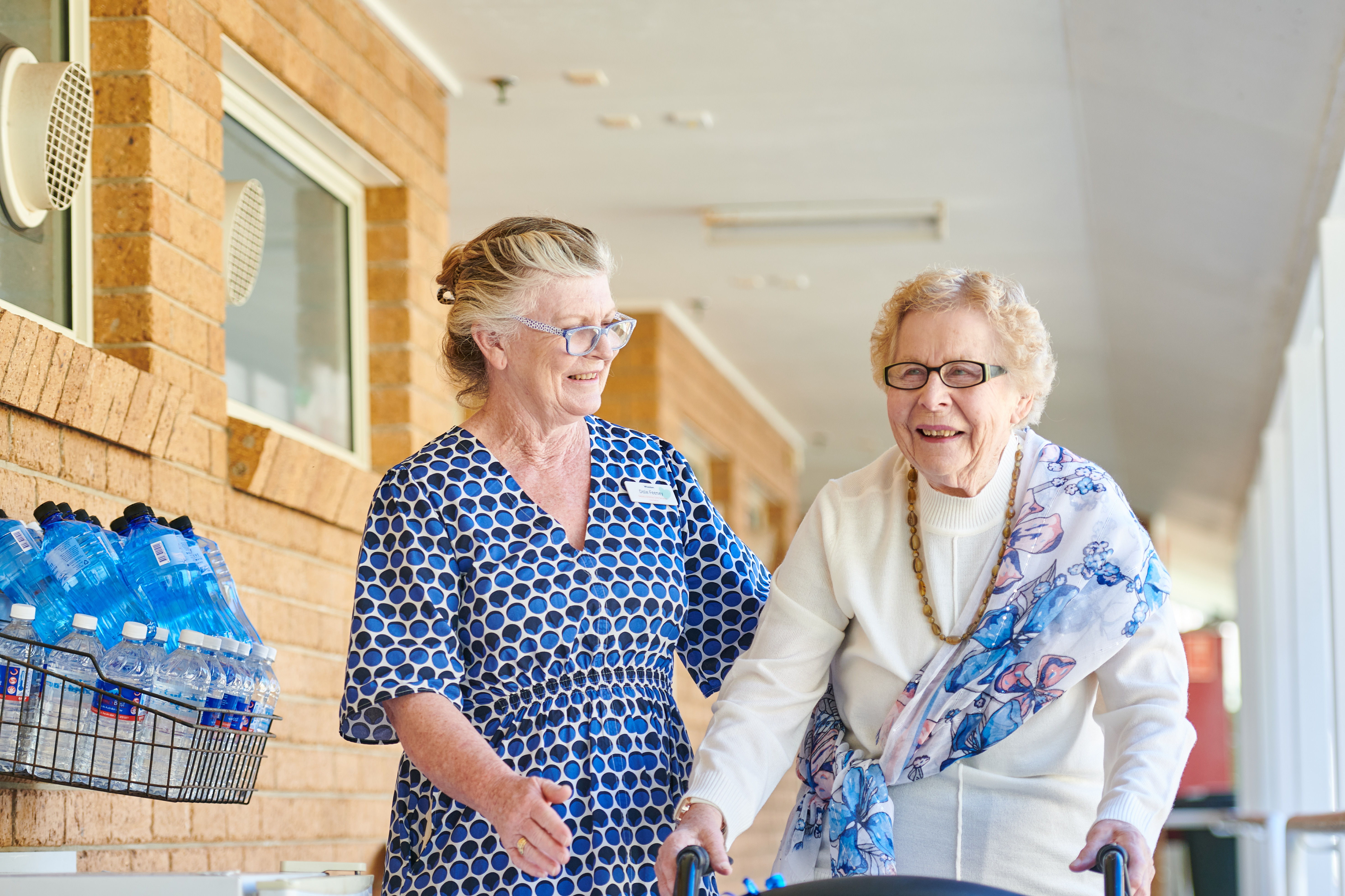Why a Dementia Diagnosis Hasn’t Stopped Dale & Peter from Living a Life They Love: New Learning Program to Transform Care for People Living with Dementia
Despite receiving a Dementia diagnosis in 2019, Dale and Peter Feeney are living a vibrant life. A new micro-learning program being implemented across Whiddon residential aged care locations aims to enhance the care provided to Australians living with dementia.
8 September 2023
At Whiddon Laurieton on the New South Wales mid-north coast, Registered Nurse and Deputy Director of Care Services, Dale Feeney cares for residents living with Dementia in Whiddon’s dedicated Memory Support Home. At home, Dale is also the carer for her husband Peter Feeney, who was diagnosed with Dementia in 2019.
From September 18th a new twelve-week Dementia Microlearning Program will see two thousand members of Whiddon’s dedicated care staff like Dale participate to build a practical, research-led blueprint for managing Dementia in a clinical care setting. The micro learning modules are adaptable to meet the individual needs of workers to holistically improve competence, wellbeing, and self-confidence in care practices. For Dale, this means she will have more tools to support the ongoing learning of her team and also some practical tips to support her husband Peter at home.
Dale has been working at Whiddon for over 32 years and after Peter’s Dementia diagnosis in 2019, her professional life become intertwined with her personal life. Her unique perspective into Dementia care highlights what it’s like to care for someone with dementia as a family member and in a professional care setting. Dale and Peter’s story reflects the many compassionate and dedicated individuals who make a great impact on those living with Dementia, providing quality care to residents and their families.
Dale and Peter Feeney have lived an incredible life together. With 47 years of marriage under their belts, their love story is a unique one. Marked by adventures travelling around the world on the back of Peter’s motorbike with hope to continue living out their love for travel in the future. Each day, Dale and Peter make a special effort to walk along the Northaven breakwall, talk and take in the beautiful surroundings and even spot some dolphins.

Peter’s diagnosis came in 2019 after experiencing moments of forgetfulness and feeling anxious about things that wouldn’t usually bother him. The lines between Dale’s personal and professional life became blurred as they adjusted to their new normal.
Dale’s lived experience with Dementia highlights the importance and real-world impact of Whiddon’s relationship-based approach to care. Delivered through Whiddon's award-winning MyLife model, relationship-based care centers on integrating care for residents social, emotional, and physical needs and is underpinned by a strong relational approach where care staff build meaningful relationships to really understand our residents and thus deliver better outcomes and highly personalised care.
For Dale, Whiddon’s relationship-based care approach has brought her closer to understanding the needs of residents living with Dementia and provided a unique perspective of the importance of connection and support. A lesson that is echoed in how both Dale and Peter have navigated the Dementia diagnosis.
“There is often so much negativity around Dementia. What I’ve learned most is that this is not the end for Peter. Dementia does not mean the end of life. There are still adventures to be had, a life to be lived. It’s about how we support people to achieve this and be positive about it in the process,” Dale explains.
Dale continued, “It’s so important for our staff to really know our residents and to develop relationships with their spouse or family, because they know a lot about that person. We may know a lot about dementia, but it's the person that we need to know about that is so important.”
The Dementia Framework plays a crucial role in Whiddon’s care approach. Dale emphasises the importance of understanding an individuals’ needs and supporting those living with Dementia with a calm and reassuring environment:
“A calm environment is very important. You are a familiar person to them, who makes them feel safe, so when you are stressed, they feel stressed. Try and remember to remain calm, provide reassurance. Even having herbs grow in the garden, like rosemary and familiar smells is very nostalgic for individuals living with dementia and can help them feel relaxed and at home.”
Balancing her responsibilities at work and home, Dale has found ways to ensure Peter's well-being while maintaining their loving relationship. She shares, "I work part-time and when I’m at work, we have a carer who comes in and spends time with Peter. I like to still think of myself as Peter’s wife, and not his carer."
Dale and Peter are determined to continue making memories, even if their new normal looks a little different. Dale excitedly mentions their plans for a trip together next year, confirming their heartwarming love for travel and each other.
“I keep telling Pete, we’ve had an amazing, full life. We’ve travelled the world. We have a beautiful family and home. Even if we did nothing else, we have had an incredible life.”
“But this isn’t the end, and although we may not be travelling on a motorbike, we are planning a trip together next year so we can continue our love of travel together.”
Looking ahead, Dale acknowledges the possibility that she may not be able to care for Peter at home forever. When that time comes, she plans for him to receive the best care at Whiddon Laurieton, where she works.

About Whiddon
Whiddon is an award-winning care provider with residential care, community care and retirement villages across metropolitan, regional, rural, and remote New South Wales and Southeast Queensland.
Whiddon has been providing exceptional care to older Australians and people with disabilities for more than 75 years, and has grown to be an industry-leading, not-for-profit aged care organisation caring for close to 3,000 customers with over 2,500 employees.
Whiddon is passionate about enriching lives and keeping older people connected to what matters most to them in life. The organisation aims to really understand each person through building deep relationships with them, their family, and their community.
Whiddon proudly partners with academics and universities that are developing the latest thinking, innovation, programs, and training around quality of life and ageing.

